The trip was organised by the North Asia Centre of Asia-Pacific Excellence (CAPE) which is a government-funded entity that aims to bridge the gap between New Zealanders and the North Asia area, particularly in terms of trade and business opportunities. The trip Wainui took part in was specifically for technology.
It all happened in the space of a week
Wainui was contacted by Lee Timutimu from Te Matarau (Māori Tech Association) who recommended she apply for the trip. From first hearing about it, to applying, to being accepted, it all happened in the space of a week. “I was quite nervous to travel overseas because of my low vision,” Wainui says. “I've only been to Australia to see my Dad and so I initially asked if I could take a support person with me on the trip.” However, due to the rapid pace in which the trip was being organised and the additional complication of visas, Wainui decided not to take a support person with her and just went for it.
“Going by myself was a really, really cool experience, and I'm very glad that I did do it by myself. I was supported by Rachel [Kingi, from CAPE], who came as a cultural safety person for us on the trip, and I was supported by the rest of the group and I think my independence and my outlook on it is a lot better. I learned how to be by myself a little bit, even though it was quick and I can take those independent skills and incorporate that back into my daily life.”
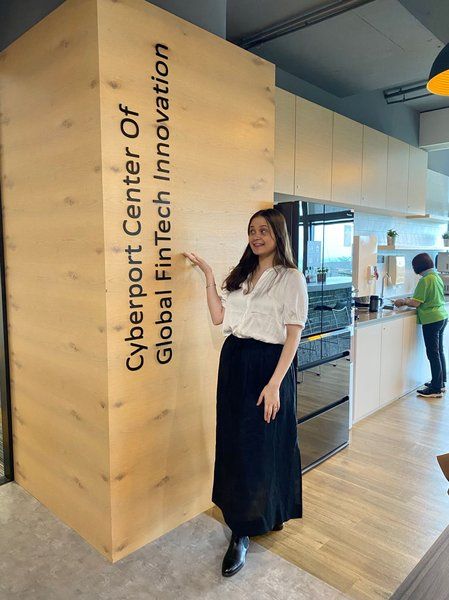
Wainui standing next to a sign for Cyberport Center of Global FinTech Innovation.
Take your expectations and your biases away
The Tech Study Tour was a week-long in total and included time spent in Hong Kong, Shenzhen, Nansha and Guangzhou. The group was made up of people who work in or are associated with the tech industry. Wainui was the only developer; she says many of them were CEOs or had their own start-up companies. “It was quite cool to have such a diverse range of people to talk to about things,” she says. “I really learnt a lot from the cohort itself.” One of her main takeaways from the trip was the career aspect of it; developing skills and making connections.
“We got told 'take your expectations and your biases away first and just see what it's like'. I don't think I had a full cultural experience,” Wainui says. “I didn't see really any poverty or anything and everything was really clean, it was the very cherry-coated version of it, which I'm very aware of. That culture and experience, to try and do shopping and things with the language barrier, which I've never experienced before, was really, really cool.” The language barrier meant that one of the main reasons they were there, the ARVR Fair, was hard to engage with.
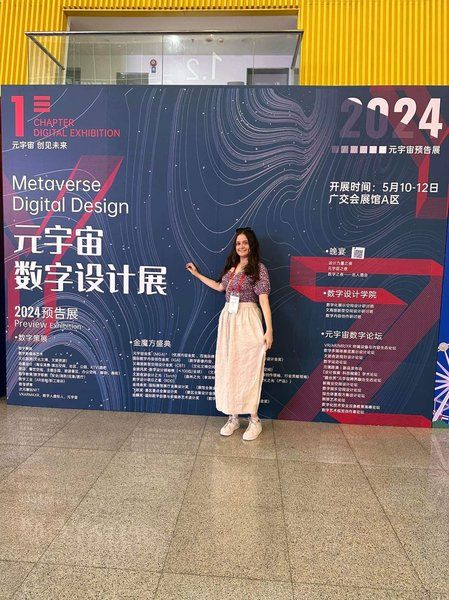
Wainui stands in front of a large sign at the ARVR fair in China.
One of the things Wainui learned was about opportunities to take a technology business over to that part of the world. “I've learned about how Hong Kong is a bridging country between the rest of the world and China, as it was a British colony. So they have a lot of laws that are more similar to the outside world and so things can go and get set up in Hong Kong and then easily shift to China from there.”
“That's something I had never had any idea or understanding about as I have not generally been interested in business before. But talking to people who have lived experience and who have a passion for these things is making me think about it in a different light. Also thinking about the why behind your business. A lot of them are to make money, but there are other opportunities out there that can make an impact.”
Visiting local tech businesses
The group visited a range of different tech businesses in each location. In Hong Kong they saw how cheaply you can set up a company in Hong Kong and China by renting a desk in a co-working space, such as Cyberport, Bee Plus, and Innovation Bay, which meant businesses had a physical office location with a low entry cost.
One of the businesses that sparked Wainui’s interest was iFlyTek in Guangzhou, which has technology that instantaneously translates from one language to another. Their main product translates from English to Chinese and vice versa, with various different options between speech and text.
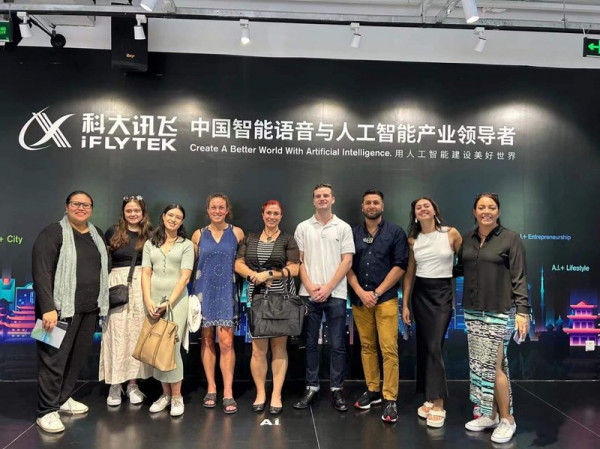
A group of 9 smiling people are standing by a sign for iFLYTEK.
The Baidu Apollo Park was another highlight; they have autonomous driver-less vehicles that are already deployed on the roads in Guangzhou, and are being tested around Beijing. Different technologies are combined, including radar, lidar, and image recognition to drive the cars autonomously, as well as implementing Internet of Things devices. “So they're using sensors on the roads, they're using cameras on the roads, everything's just deployed into the car as well as on the roads to make an as seamless as possible autonomous experience,” says Wainui. “This works well because they work with the Chinese government to be allowed to monitor these things.”
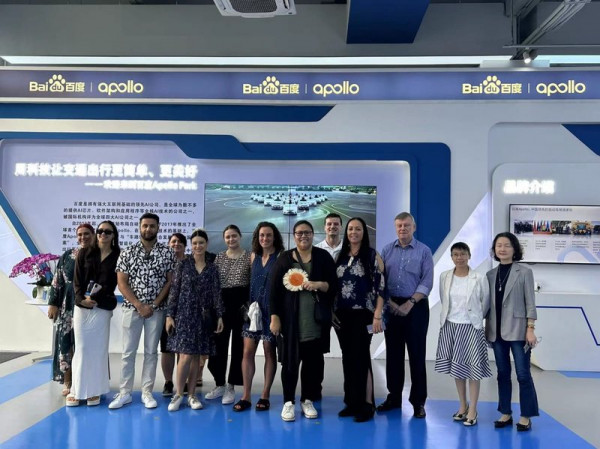
A group of people standing outside the Baidu Apollo park in China.
Visiting NZTE
A visit to the New Zealand Trade and Enterprise offices in Guangzhou led to meeting user experience designer Peter Reid, who works with accessibility, in particular accessibility for intellectually disabled people. “He was such a pleasure to meet and probably one of the biggest highlights of my trip,” Wainui says. “He said that he came particularly because he saw that I was interested in accessibility and we had a lovely korero where one of our other cohort members said that she has a daughter who is nonverbal and really appreciates the work that people such as Peter and myself are advocating and doing and that was really, really humbling. Awesome just to know that all my forcing people to think about accessibility is actually helping people.”
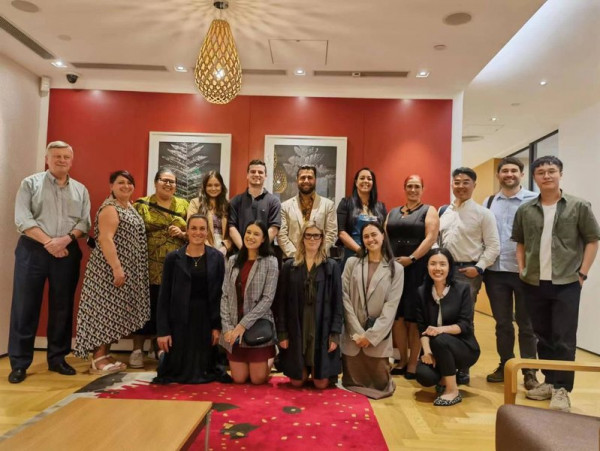
A group of people standing and sitting in front of a red wall with art on it at the NZTE office in Guangzhou.
Local culture highlights
“One other highlight of my trip was going to Chali. It's a tea factory so it was a little bit less tech-based, but it was still very cool because we saw some incredible machinery that helps them to produce their products and some of them have strengths in some areas and weaknesses in some areas. So they use a combination of different machinery and humans to create and package up the products. We also saw people who were studying for their masters in tea and I think this was a really cool place to go because it touched on some historical culture of China as tea comes from China and the British stole it from them. It was a lovely experience. Got to do some tea sampling, buy some gifts for back home, and it was just a really cute thing to add in.”
“They also had a tea library where they used a cataloguing system which was very exciting for me as I work on Koha which is a library system!”
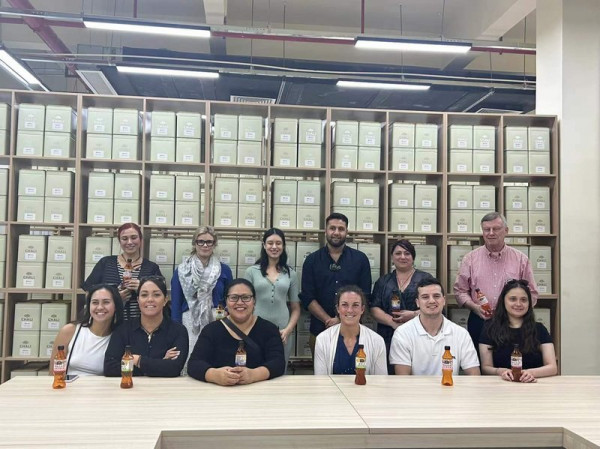
A group of people are sitting and standing in front of a row of boxes at the Chali tea factory.
